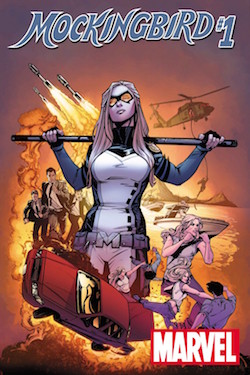Thursday Comics Hangover: Doctor's orders

Mockingbird feels like the first chapter to a well-structured story. Most of the book takes place in a doctor’s office; Mockingbird is called in for frequent checkups due to her exposure to a volatile super soldier serum in her origin story. (She asks the reader in one caption: “If you could live forever but had to have a colonoscopy every week for the rest of your life would you do it?”) The book has an irreverent sense of humor to it. Tony Stark, in the opening scene, sits in the same waiting room as Mockingbird, casually flipping through a pamphlet on gonorrhea. The book skips forward in time through several of Mockingbird’s doctor visits. Her health deteriorates, but she lies to her doctors about it. Supposedly important events happen in between the visits, but we don’t know what they are. One of them involves a corgi.
In a note at the end of the issue, Cain admits that the first issue “makes no sense,” which is selling herself short. She explains that the next three issues of the story will spell out what happens in between each of the doctor visits, and then the fifth issue will tie the whole story together. It’s kind of a shame that Cain felt compelled to give away the structure of the story in a prose piece at the end of the first issue, but the volatility of the comics market probably demanded it; mainstream comics are selling so poorly nowadays that new series might not even get five issues with which to prove themselves.
Mockingbird is a series that deserves to survive. Unlike most novelists who break into comics, Cain is excellent at the form; she doesn’t overwhelm the reader with too many words, and she trusts her artist to tell the bulk of the story. The artist, Kate Niemczyk, is especially good at drawing people: her characters are eminently watchable, with lively body language and expressive faces. Niemczyk also pulls off some fun iconography tricks later in the issue, which help demonstrate the increasing mental pressure on Mockinbird to perform correctly during her medical examinations.
The coloring by Rachelle Rosenberg, too, is exceptional. It feels, and I mean this as a compliment, very comic-book-y, with a lot of vivid primary colors throughout. But Rosenberg also lays down quite a few patterns in the issue — a swirly circle pattern on one nurse’s scrubs, a floral pattern in one office, a beautifully garish explosion pattern behind Mockingbird in a climactic panel — that add to the atmosphere of intricacy.
Together, the three creators manage to tell a psychologically engrossing spy story told almost entirely in visits to a health care provider. The drifting sense of loyalty you find in most good espionage thrillers works exceptionally well in a medical setting. Everybody lies to their doctor, as Mockingbird notes in the issue, but what if your doctor was actively plotting against you? Worse, what if you couldn’t tell if your doctor was trying to do you in or not? It’s enough to make somebody sick.